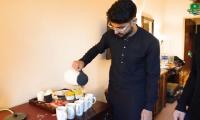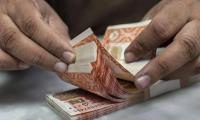LAHORE: As the country gears up to witness the eventful Pakistan Super League (PSL) Second Edition Final between Quetta Gladiators and the Peshawar Zalmi Cricket teams at Lahore’s intensely-fortified Gaddafi Stadium Sunday (today), it is perhaps one of the most heavily-guarded sporting event after the February 7, 2016 American football game, which was held at Santa Clara (California) to determine the 2015 season champion of the US National Football League.
Research shows that the aforementioned game, also called Super Bowl 50, was played in a ring of most intense security ever witnessed at a sporting event in American history. Security at the Santa Clara stadium in California was tight at the game entrances as well as game-related venues.
Fans were subjected to usual metal detectors garnering long lines into the stadium. Only clear bags were allowed inside and items such as banners, camcorders, aerosol cans and umbrellas were strictly prohibited.
This particular game’s broadcast was the third most-watched programme in American television history with an average of 111.9 million viewers and the CBS Television network had charged an average of $5 million for a 30-second commercial during the game!
The “USA Today” had reported: “A few steps inside the stadium entrance here at Super Bowl 50, a uniformed member of the National Guard watched the crowd with a machine gun strapped to his chest. A few feet away from him, a black dog on a leash patrolled the stadium with a sign that said, “Do not pet.” The dog is specifically trained to detect body worn explosives on a moving target. Some might describe it as a military state — an uncommon show of force amid the wine-and-cheese scene in the Bay Area. But the fans who attended Sunday’s game said it made them feel safer after the recent terrorist attacks in Paris and San Bernardino. Besides bomb-sniffing dogs, machine guns and armored trucks, several government agencies monitored the ground and the air, including the FBI, the U.S. Coast Guard, the California Highway Patrol and police from the U.S. Department of Homeland Security.”
The prestigious American media outlet had added: “Few details were too small for security staffers. They also told media at the game to flip over their game-access credentials so they don't face outward in public. That way nobody could take a picture of the credentials and attempt to gain entry with counterfeit credentials. Lines to get into Levi’s Stadium still moved pretty quickly, considering all the extra precautions. McCarthy and other fans said it only took five to 10 minutes to wait in line and get patted down by stadium security staff before walking through the metal detector.”
The precedent cited above might help some vocal PSL critics tone down a bit now, in case they wish to continue criticizing the PSL boss Najam Sethi and Company for the sake of criticism. These PSL critics have rightly pointed out that the PSL final has turned Lahore into a war zone bunker amidst a curfew-like situation on the deserted roads — causing inconvenience to the city’s resident — but then the advocates of this professional franchise Twenty20 cricket argue that desperate times warranted desperate measures — give the bitter memories of terrorism that has been rampant in Pakistan for decades and the 2002 bomb blast near the News Zealand Cricket team hotel in Karachi and the infamous 2009 firing on the Sri Lankan Cricket bus near Lahore’s Gaddafi Stadium, which had injured many foreign players and officials just metres away from the ground.
Well, some of the PSL critics-- till the filing of this report on Saturday evening-- had also asserted that top class international cricketers might not fly to Lahore from Dubai to play in the final match.
The PSL advocates were quick to point out that a good number of big and current global cricketers were surely turning up to play the game that has cast quite a spell on cricket-deprived Pakistan.
The PSL advocates have cited a few big international cricketing names to cite in this context: They maintain that while the 33-year old Peshawar Zalmi captain Darren Sammy has not retired from international cricket and has played 38 Test matches (1,323 runs and 84 wickets), 126 One Day Internationals (1,871 runs and 81 wickets) and 66 T20 International matches (534 runs and 44 wickets), his West Indian colleague Marlon Samuels has played 71 Test Matches (13,917 Runs with 7 centuries and 41 wickets), 187 One Day Internationals (5,180 runs with 10 centuries and 85 wickets) and 51 T20 International matches (1186 runs with a highest of 85 and 19 wickets).
Similarly, Chris Jordan, the young English all-rounder representing Peshawar Zalmi franchise, has played eight Tests, 31 One-Day Internationals and 22 Twenty20 International in his short career.
By the way, the Quetta Gladiators’ mentor and one of the most devastating and stylish batsmen ever seen in the game’s history, Sir Vivian Richards, who will be celebrating his 65th birthday on March 7, has played 121 Tests (8,540 runs with 24 centuries and 32 test wickets), 187 One Day Internationals (6,721 runs with 11 centuries and 118 wickets) for the West Indies.
Soon after the names of Sharjeel Khan and Khalid Latif had surfaced in a match-fixing scam right at the start of this tournament, numerous PSL critics that begun to raise suspicions that the whole tournament was plagued with the menace, and that a lot of hue and cry would be raised once former Pakistani cricketer Nasir Jamshed made some confessions in London in near future.
The PSL advocates say that Najam Sethi would take the lead in identifying the black sheep himself and that it was too early to comment on the extent of match-fixing in this tournament. These PSL advocates argue that spot-fixing was a common event in many global sporting events including the football fixtures and cash-rich and glitzy Indian Premier League (IPL).
They point out that during IPL 2012, an Indian news channel “India TV” had aired a sting operation in May 2012, which had accused five players involved in spot-fixing. Reacting to the news, Indian Premier League president Rajiv Shukla had immediately suspended the five uncapped players.
During IPL 2013, Delhi police had arrested three cricketers including Indian international cricketer Sreesanth in 2013 for spot-fixing.
Even the Chennai Super Kings (CSK) team principal Gurunath, who happened to be the son-in-law of the then Indian Cricket Board President Srinavasan, was arrested on charges of betting in May 2013.
After his arrest, the CSK franchisee immediately disowned Gurunath. In a press statement in May 2013, Messrs India Cements, which owned the CSK franchisee said: "Mr. Gurunath Meiyappan is neither the owner, nor the CEO/Team Principal of the Chennai Super Kings.”
On 26 May, 2013, BCCI had announced that a three-member commission would investigate the role of Meiyappan in the spot-fixing and betting scandal.
On 5 June 2013, Rajasthan Royals team co-owner Raj Kundra was questioned by the Delhi police for alleged involvement in illegal betting.
On 6 June 2013, Delhi police had claimed that Kundra had confessed to them of placing bets on his IPL team through a bookie who was his friend.
On 7 June 2013, Rajasthan Royals team management had said that Raj Kundra would be suspended and all his shares in the team taken back if the charges against him of betting were prove. Due to this episode, Raj was suspended from the IPL by the BCCI on 10 June 2013.
On 25 March 2014, the Supreme Court of India told Indian cricket Board President Srinavasan to step down from his position on his own as BCCI president in order to ensure a fair investigation into the betting and spot-fixing charges levied against his son-in-law Meiyappan.
In July 2015, as a British media house “The Mirror” had reported, two IPL franchises, the Chennai Super Kings and Rajasthan Royals, were suspended from the lucrative Twenty20 tournament for two years.
“The Daily Mirror” had stated: “The two sides — who have won three of the eight tournaments contested since the inaugural competition in 2008 — have both been found guilty in an illegal betting and match-fixing probe. Justice RM Lodha also banned Meiyappan, a former team official of Super Kings, and Raj Kundra, a former Royals co-owner, from any involvement in cricket matches for life.”
Match-fixing controversies in South African Premier League and other domestic cricket fixtures:
Four South African cricketers, including former test wicketkeeper Thami Tsolekile, were banned for between seven and 12 years for attempting to fix matches, Cricket South Africa had announced in August 2016.
On December 21, 2016, Alviro Petersen, the former South Africa opener, had been banned for two years by Cricket South Africa after admitting to 13 breaches of the anti-corruption code in relation to the 2015-16 domestic T20 match-fixing scandal.
Match-fixing controversies in Bangladesh Premier League:
In November 2016, a probe was launched into allegations by a player that he was asked to fix matches during the latest scandal-hit Bangladesh Premier League Twenty20 tournament
The Times of India had reported: The Bangladesh Premier League has been blighted by fixing rows ever since it began in 2012. The tournament was suspended for a season in 2014 following revelations that former Bangladesh captain Ashraful and four others including New Zealand’s Lou Vincent were involved in fixing matches. Ashraful was banned for eight years after he tearfully confessed on national television, but was allowed to return to domestic cricket earlier this year.”
Former Bangladesh spinner Shariful Haque was earlier banned in September 2012 on similar charges.
West Indian player suspended in Caribbean Premier League:
Franchise Trinbago Knight Riders’ quest for their second successive Caribbean Premier League triumph was handed an unwanted distraction with reports confirming that the team’s left-handed opening batsman and part-time wicketkeeper William Perkins was suspended immediately from the CPL after he was found guilty of handing over his players’ access pass to a third party — a serious breach of the ICC’s player contract.
Match-fixing dangers lurk over Australian Big Bash too:
In December 2016, “Fox Sports” had reported that Australian cricketers were on the verge of making it to national squads and the Big Bash League were being targeted by bookmakers via social media.
The “Fox Sports” had maintained: “Cricket Australia head of integrity Iain Roy confirmed that foreign bookies are targeting players via tools such as Twitter, Instagram and Facebook as they seek information on squads and playing conditions. Rising young stars of the game are the main target, Roy revealed, but he would not elaborate on how many players had been approached.”
Hospital management responded that only one post of BS-19 was vacant which is to be filled through direct recruitment
PMLN does not have a mandate from the people for privatising the SOEs: says Rabbani
Administrative Service Ali Hussain Malik and made him OSD in the Establishment Division
Establishment Division had notified Rizvi’s appointment as IGP Islamabad on March 30, but the Punjab government...
A British citizen of Pakistani origin has lodged formal complaint against FIA officer, alleging torture during a...
Former COAS admitted the army extended full support to Imran Khan’s government







